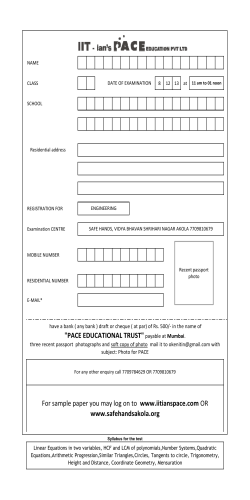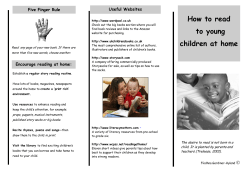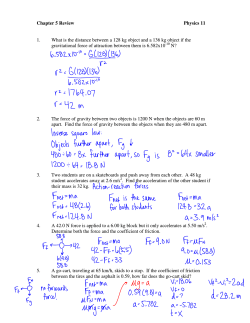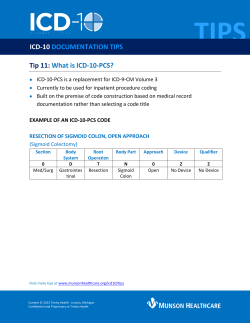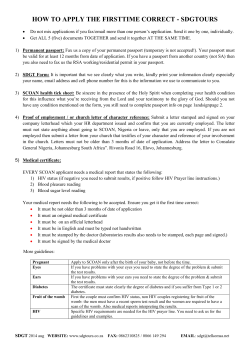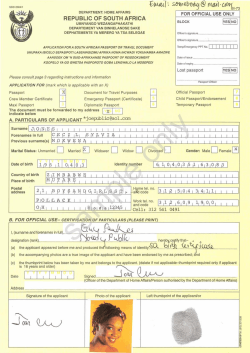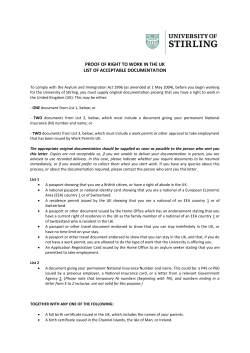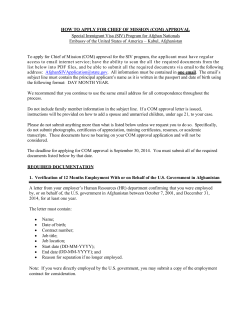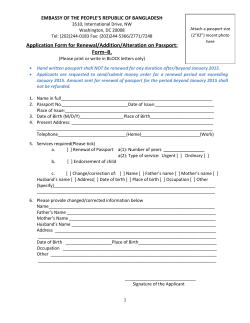
Safety Abroad Andy Altizer Dr. Kathy Allan, M.D. Office of Emergency Preparedness
Safety Abroad Andy Altizer Office of Emergency Preparedness Dr. Kathy Allan, M.D. Stamps Health Services 1 October 23, 2013 Bottom Line Up Front! Use Common Sense Trust Your Instincts 2 Adapted from the “Routine Activities Theory” (Cohen and Felson, 1979) Bottom Line Up Front! According to U.S. State Department, the four overall risks most Americans should keep in the back of their mind when traveling abroad: 1. Traffic Accidents 2. Health 3. Alcohol & Drugs 4. Sex 3 Agenda • • • • • • • • 4 Risk Before You Go While You Are There Travel Tips State Department Advice Top 10 Ways Not to Become a Victim Special Considerations for Women Health Issues Risk Primary • Crime (Theft #1) • General Health Other • Violence • Natural Disasters • Contagion (H1N1, MERS, H7N9, EIEIO) • Civil Disorder • Unknown Event 5 5 Before You Go 1 of 2 Make sure you have a plan – including a communications plan • The first thing to do is create a back up plan. Someone who knows you and your personal information. Make copies of your passport, and ID • Check with your current cell phone provider to see if your phone will work overseas. Some cell phones need only to be “Turned on” by the company. • Check the web for worldwide cell phone services. There are companies that will provide a local cell phone for a fee. • Know the phone numbers of your itinerary in advance and provide them to people here that may need them. Have preplanned phone in times. 6 Before You Go 2 of 2 • Prearrange transportation before you arrive. • Visit the State Departments website at www.travel.state.gov. For information about the country you will visit. • Register your travel plans with the State Department through a free online service at https://travelregistration.state.gov. 7 While You Are “There” • Travel in groups as much as possible, but don’t “sightsee” in large English-speaking group. • Do not hitchhike. • Carry only what you need. • Keep backpacks and book bags in hands at all times. • Stay away from protest groups. • Adjust to local customs and dress. 8 Travel Tips 1 of 2 • Stay with your luggage until it is checked. • Carry important papers with you; NEVER check anything that you simply cannot afford to lose. • Never wear anything that projects affluence (Leave jewelry at home) • Never accept a drink from a stranger. • Only stay in a hotel that uses cards to open room doors and make sure your room has a peephole and deadbolt lock. Secure the chain and secure the door by pushing a rubber stop under it. 9 Travel Tips 2 of 2 • Stay in a room near a stairwell. Always stay in a hotel where the doors enter the hallway and not directly from the outside. • If your cell phone does not work outside of the country, consider renting one that does for the duration of your trip. • Never flash your money in public. 10 State Department Travel Tips 1 of 3 • Register so the State Department can better assist you in an emergency: Register your travel plans with the State Department through a free online service at https://travelregistration.state.gov. This will help them contact you if there is a family emergency in the U.S., or if there is a crisis where you are traveling. In accordance with the Privacy Act, information on your welfare and whereabouts will not be released to others without your express authorization. • Sign passport, and fill in the emergency information: Make sure you have a signed, valid passport, and a visa, if required, and fill in the emergency information page of your passport. • Leave copies of itinerary and passport data page: Leave copies of your itinerary, passport data page and visas with family or friends, so you can be contacted in case of an emergency. 11 State Department Travel Tips 2 of 3 • Check your overseas medical insurance coverage: Ask your medical insurance company if your policy applies overseas, and if it covers emergency expenses such as medical evacuation. If it does not, consider supplemental insurance. • Familiarize yourself with local conditions and laws: While in a foreign country, you are subject to its laws. The State Department web site at http://travel.state.gov/travel/cis_pa_tw/cis/cis_1765.html has useful safety and other information about the countries you will visit. • Take precautions to avoid being a target of crime: To avoid being a target of crime, do not wear conspicuous clothing or jewelry and do not carry excessive amounts of money. Also, do not leave unattended luggage in public areas and do not accept packages from strangers. 12 State Department Travel Tips 3 of 3 • Contact them in an emergency: Consular personnel at U.S. Embassies and Consulates abroad and in the U.S. are available 24 hours a day, 7 days a week, to provide emergency assistance to U.S. citizens. Contact information for U.S. Embassies and Consulates appears on the Bureau of Consular Affairs website at http://travel.state.gov. Also note that the Office of Overseas Citizen Services in the State Department’s Bureau of Consular Affairs may be reached for assistance with emergencies at 1-888-407-4747, if calling from the U.S. or Canada, or 202-501-4444, if calling from overseas. 13 Top 10 Ways to Not Become a Victim of Crime Around the World 10.Don’t be an obvious foreigner 9. Leave jewelry at home. 8. Keep copies of your passport and hide the original 7. Listen to your gut. 6. Learn where your embassy or consulate offices are located. 5. Read local English-language newspapers, if possible. 4. Avoid unexpectedly amorous men and women. 3. Become aware of real security threats. 2. Avoid hotspots. 1. Control the things you can control and don’t panic. 14 Special Considerations for Women 1 of 3 • In many countries women have an expected form of dress. Dress to not call attention to yourself. Try to fit in with the culture to show respect. Dress modestly. • Travel light! You will be less vulnerable and much more independent. • Avoid opening a map while out on the street. • Never accept food or drink from strangers. • Don’t leave drinks unattended. • Consider investing in a self-defense course designed for women. • Choose your accommodations carefully. Smaller hotels are often better because you will become familiar with guests, staff and your surroundings. 15 Special Considerations for Women 2 of 3 • Travel early enough so you will arrive before dark. • Never accept a room if the check-in clerk calls out your name or room number. • Avoid ground-floor rooms. • Do not get into an elevator if you do not feel safe. • Before traveling, find out as much about the roles of both women and men where you plan to visit. Some cultures: – Consider it improper for a woman to travel solo – Making eye contact with a man, or simply smiling, may suggest that you want his company. (sunglasses may be a common sense solution) • Remember, you may look different than local woman, and people might even stare out of curiosity. • Take your cue from local women. 16 Special Considerations for Women 3 of 3 • Crowed trains and buses can be hot spots for anti-social behavior. • Talk to female passengers and flight attendants on the plane about the safety of your destination. • Rent a mobile phone if yours doesn’t work. • In some countries, theft doesn’t warrant police investigation, but murder of a foreigner is a major event, so consider giving up your money if robbed. • On the other hand, if attacked, RUN, YELL and/or FIGHT! 17 Special Note About Earthquakes and Tsunamis Earthquakes • Worldwide, each year there are about 18 earthquakes magnitude (M) 7.0 or larger • San Andreas Fault in California • Parts of China, Japan, Chili, Solomon Islands, New Guinea, Iran, New Zealand… Tsunamis • Signs of a Tsunami: – Strong earthquake lasting 20 seconds or more near the coast – Noticeable rapid rise or fall in coastal waters – Loud roaring noise from the ocean. • Historically tsunamis have affected coastlines and islands worldwide. • Pacific Islands, Chili, Japan, Indonesia, Peru, Hawaii, Alaska and the West Coast (California, Oregon, Washington). • Unlike in the Pacific, there is no organized alert service covering the Indian Ocean. • A tsunami cannot be prevented or precisely predicted - even if the right magnitude of an earthquake occurs in the right location. 18 Earthquakes 1 of 2 • The main point is to try not to move and to immediately protect yourself as best as possible where you are. • Earthquakes occur without any warning and may be so violent that you cannot run or crawl; you therefore will most likely be knocked to the ground where you happen to be. • "Drop, Cover, and Hold On" is the appropriate action to reduce injury and death during earthquakes. – DROP to the ground (before the earthquake drops you!), – Take COVER by getting under a sturdy desk or table, and – HOLD ON to it until the shaking stops. • If there isn’t a table or desk near you, drop to the ground in an inside corner of the building and cover your head and neck with your hands and arms. Do not try to run to another 19 room just to get under a table. Earthquakes 2 of 2 • What NOT to do: • DO NOT get in a doorway! In modern houses and buildings, doorways are no safer, and they do not protect you from flying or falling objects. Get under a table instead! • DO NOT run outside! Trying to run in an earthquake is dangerous, as the ground is moving and you can easily fall or be injured by debris or glass. Running outside is especially dangerous, as glass, bricks, or other building components may be falling. You are much safer to stay inside and get under a table. • DO NOT believe the so-called "triangle of life"! In recent years, an e-mail has circulated which has recommends potentially life threatening actions , and the source has been discredited by leading experts. 20 Tsunamis • Adhere and take action when warned. • Move quickly to higher ground away from the coast. • During the Indian Ocean tsunami of 26th December 2004, the sea withdrew and many people then went onto the exposed sea bed to investigate. Pictures taken show people on the normally submerged areas with the advancing wave in the background. Most people who were on the beach were unable to escape to high ground and died. • http://www.tsunamiready.noaa.gov/ • See handout. 21 Remember! Traveling overseas introduces Americans to new types of risk. As a rule, people are more likely to be targeted by criminals when they are in unfamiliar surroundings. Key to safe traveling in any area is situational awareness. Distractions because of luggage, children, hotel personnel, strangers, etc. can put you at risk. Know your surroundings and stay in control of every situation. Use Common Sense Trust Your Instincts 22 Travel Abroad Clinic Stamps Health Services 23 Pre-travel preparation---Why?????? • Protect yourself from infectious diseases • Prevent illness from interfering with your planned activities • Prevent jeopardizing your friends and family when you return 24 Obstacles • Poor planning – Short notice trip – Unaware of needs – Not viewed as necessary • Expatriates (VFR)—most likely to get sick (higher degree of exposure) • Cost 25 Key components of a pre-travel visit • Itinerary-destination & duration planned activities/season travelling • Health history-underlying health issues • Prior vaccinations • Safety measures beyond vaccines Goal: To mitigate illness during and after your trip 26 Itinerary • Dates and duration of travel in chronological order • Countries and the regions within the country • Settings—urban vs. rural • Type of accommodations • Purpose of trip 27 Health history • Underlying medical problems • Current medications • Previous vaccination history with dates received 28 3 R’s of Immunization • Routine: MMR, Tdap, Varicella, Hep B, Hep A, Polio, Flu • Required: – Yellow fever – Meningococcal • Recommended: – Japanese encephalitis – Rabies – Typhoid fever 29 Required vaccines • Yellow fever – – – – 30 Need a yellow card for proof of vaccination Traveling to Africa/South America Traveling from a country at risk—even in airports Mosquito transmission—Death occurs in up to 50% (no treatment available) Required vaccines • Meningococcal – Traveling to Saudi Arabia/Sub-Sahara Africa – Highest risk from December to June – Risk increases with prolonged contact with the local population/dorm room accommodations – Transmitted through saliva and respiratory secretions – Can be fatal within 24 hours – Required--pilgrimage to Mecca 31 Recommended vaccines • Routine vaccinations • All routine vaccines should be up to date: MMR, Varicella, Tdap, Hep A, Hep B and Influenza Polio booster --- One time vaccination for adults (18 yo and older) travelling to endemic areas • certain areas in Asia and Africa • Japanese Encephalitis — spread by mosquitoes At greatest risk if staying > one month or on a pig/rice farm area • Rabies (almost always fatal) --- spread by bites or scratches of infected wild or domestic animals, bats & monkeys • Typhoid fever —spread by intake of contaminated food/water common in the Caribbean/Central & S.Amer/Asia/Africa and the Indian subcontinent 32 Most Commonly Contracted Infectious Diseases when traveling • 20 to 70% ---- Traveler's Diarrhea • 3% ----Malaria • 1% ----Influenza/Dengue Fever • • • • • 33 Others: 0.5%---------Animal bites/PPD conversion 0.05%-------Typhoid Fever/Hep A 0.0001%----Japanese Encephalitis <0.0001%--Meningitis/Polio Beyond vaccinations • Goal: To mitigate health risk – Protection/avoidance of vectors – Food and water precautions – Self treatment – Basic tips 34 Protection/avoidance of vectors • Vectors—mosquitoes, sand flies, ticks, spiders, snakes, parasites • Protection from vectors: – Malaria chemoprophylaxis – Insect repellent—DEET 30%--pump bottle – Ultrathon (long acting repellent—last 12hrs) – Permethrin clothing spray – Mosquito netting – Sleeping off the floor/wearing shoes 35 Food and water precautions • Eat, Drink and Be wary – Boil it, Cook it, Peel it or Forget it – Beware of unpasteurized milk products – Wine and beer, carbonated beverages & bottled water------- ok to drink • Fresh vs. Salt water – Wear shoes on beaches 36 Self Treatment • Traveler’s diarrhea-20 to 70% of travelers develop diarrhea – Recommend carrying an antibiotic and antidiarrhea medication for use if needed – Treatment consists of: • Fluids-with salt and sugar (like gatorade) • Imodium to slow diarrhea • Antibiotic for self treatment • Adequate supplies of prescription and OTC medications ----- may need a letter of medical necessity 37 Basic tips • Wear seat belts • Sunscreen-at least SPF 30 (screen 1st then repel) • Medical travel insurance with evacuation coverage—usually provides a 24 hr hotline • Carry a list of your medications and medical problems in your baggage • Identify high quality health care facilities at your destination • Avoid excessive alcohol/travelling alone 38 When to seek medical care during travel • • • • • Diarrhea with fever>102F or bloody diarrhea Flu-like illness especially in malaria-risky areas Animal bite/scratch Sexual assault MVA or serious injury • For help locating medical assistance abroad contact: -- local US Embassy or Consulate usembassy.state.gov/ -- insurance carrier’s 24 hr hotline 39 When to seek medical care once home • • • • Fever >102F Persistent gastrointestinal symptoms Respiratory symptoms (Flu, TB, MERS, others) Skin lesions/rash • Travel related symptoms usually occur within the first 3 months, but can be longer • Flu-like symptoms-- up to one year (occ 2 years) after travel could be related to malaria -- alert your provider 40 Travel Prepared • Be proactive! – Start early-See your doctor at least 6 to 8 weeks prior to the trip – Take your itinerary to the visit – Take your immunization record and yellow card to the visit – Give your insurance carrier your travel plans—evacuation issues • Be prepared! – Get the recommended vaccinations – Take the travel specific medications recommended – Travel with extra prescription medications in a carry-on bag – Prescription in the original bottle – Know what to do if you get sick or injured 41 Travel Prepared and Travel Well! Questions? 42 Thank You! 43
© Copyright 2026
